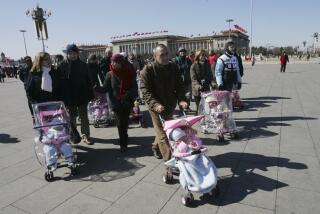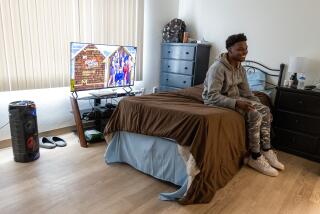Adoption Wears Many Faces
- Share via
The common thread among all the states that prohibit or impede adoption by gays and lesbians is their stated desire to provide the best possible homes for children.
It is not homophobia, they assert, to enact laws and policies acknowledging the benefits of parenting by both a mother and a father who are married to each other. They invariably add--during legislative or courtroom debates if not in statutory language--that preventing homosexuals from adopting effectively protects children from being negatively influenced or even physically harmed by the adults who are supposed to protect them.
All those arguments are ill-informed and disingenuous nonsense.
If politicians and judges in these states truly believed their own words, they would act immediately to remove millions of supposedly at-risk children from families in which one or both parents are gay. More urgently, they would be using the legal system to attack the scourge of single parenthood--which deprives far more kids of two married, cohabitating, heterosexual parents than any other cultural phenomenon in history.
A serious effort to achieve either of those goals won’t be mounted anywhere, of course, though some social conservatives probably would like to see it happen. But it won’t for two principal reasons: Whatever their personal or political views, policymakers generally understand that there’s little they can do to alter the reality that diverse families of all sorts are becoming commonplace in our country; and, more pointedly, there is no credible evidence that children raised in nontraditional families suffer from a lack of love, stability or safety.
Both those points were underscored in a big way earlier this month when the American Academy of Pediatrics announced its backing for gays and lesbians in so-called second-parent adoptions, the mechanism by which one partner becomes a second legal parent to the other’s biological or adopted children. Such adoptions have taken place in about two dozen states, although only seven and the District of Columbia explicitly permit the procedure. A few prohibit it or make it bureaucratically impossible; and one, New Jersey, allows homosexuals to adopt as couples at the same time.
The academy’s support for second-parent adoptions is important not only because it puts the imprimatur of a highly regarded, mainstream organization on a controversial practice but also because an academy committee reviewed 20 years of research and concluded that children raised by homosexuals are just as well-adjusted as their counterparts reared by heterosexuals.
This is obviously good news for gay-rights proponents, as well as for advocates of nontraditional families. It would be a huge mistake, however, for policymakers to interpret the academy’s findings too narrowly: The findings also should broaden the pool of perspective parents for the tens of thousands of children who live in foster care. There isn’t a state that has enough applicants to give these kids homes, yet too many still prevent gays and lesbians from adopting.
It always has been tough to figure how anyone could conclude that a child was better off in his or her fifth foster home than in a loving, albeit untraditional family. Now, in light of the academy’s findings, it’s going to get even harder to view such policies as anything other than overtly homophobic.
The situation in Florida, the only state to ban all gay and lesbian adoptions outright, shows how silly and counterproductive the debate has been. In affirming a state law forbidding adoption by homosexuals last year, a federal court in Florida said that the three HIV-infected children being raised by a gay man (who had been named Foster Father of the Year) would be better off in a home with two married, heterosexual parents.
Never mind that children like these, with serious special needs, are languishing in every state without parents of any type. And never mind the convoluted logic that leads Florida to allow gays and lesbians to serve as foster parents but not to adopt the children they are raising anyway.
I just hope politicians and policymakers do keep this in mind as they consider the implications of the academy’s findings: As a result of changes in federal laws, Americans can adopt in any state, not just the one in which they live. So the states that try to prevent or restrict a gay or lesbian from becoming a parent cannot achieve their aim; they can only prevent children in their custody from getting permanent families.
*
Adam Pertman is the author of “Adoption Nation: How the Adoption Revolution is Transforming America” (Basic Books, 2000).
More to Read
Sign up for Essential California
The most important California stories and recommendations in your inbox every morning.
You may occasionally receive promotional content from the Los Angeles Times.













